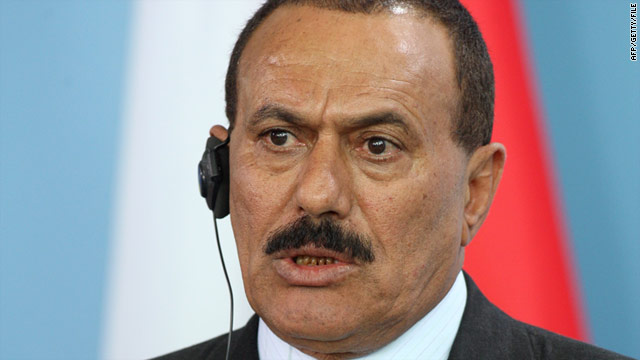 (CNN) -- Yemeni President Ali Abdullah Saleh suffered burns on 40% of his body and a collapsed lung, U.S. government officials briefed on the matter said, as the fate of the embattled leader -- and whether he will return to the conflict in Yemen -- remains uncertain.
(CNN) -- Yemeni President Ali Abdullah Saleh suffered burns on 40% of his body and a collapsed lung, U.S. government officials briefed on the matter said, as the fate of the embattled leader -- and whether he will return to the conflict in Yemen -- remains uncertain.
Sources: Yemeni president Saleh has collapsed lung, burns over 40%
By-CNN
International News
00:06
Tuesday ,07 June 2011

Saleh was injured Friday from an attack at his presidential compound and is seeking treatment in Saudi Arabia. An Arab diplomatic source with knowledge of Saleh's condition says one shrapnel wound is 7 centimeters (2.75 inches) deep.
Fighting between government and tribal forces have raged for weeks in Yemen, where thousands of anti-government protesters have been pressuring Saleh to give up power since January.
The fiercest clashes since anti-government protests started in the southern city of Taiz continued early Tuesday, with battles between anti-regime gunmen and government security forces, witnesses said.
The witnesses cited heavy gunfire near the Republican Palace, not far from the city's Freedom Square -- a focal point of anti-government protests. The witnesses did not want to be identified, citing fear for their safety.
Anti-government gunmen were trying to protect the anti-government demonstrators, who have repeatedly come under fire from security forces during the past two months.
Last week, Yemen's government faced condemnation from the United Nations and others for the killing of as many as 50 anti-government demonstrators in Taiz.
The conflict reached a pinnacle Friday, when a mosque in Saleh's presidential compound was attacked. Yemen's state-run news agency SABA reported last week that three guards and an imam were killed, citing a source in Saleh's office.
According to Western diplomats, the attack came from a bomb. Yemeni investigations are "focusing on what happened inside the mosque," not a rocket or mortar attack, the diplomats said Monday. One diplomat said the bombing was not a suicide bombing and that the Yemeni investigation "is still ongoing."
But last week, a Yemeni official who asked not to be named told CNN that Saleh was in the mosque when two "projectiles" were fired during Friday prayers.
Supporters of Sadeq Al-Ahmar, leader of the Hashed tribe and an opponent of the Yemeni government, have been suspected in the attack at the presidential compound.
Yemeni security forces shelled Al-Ahmar's home on Friday in response to the attack, leaving 10 people dead and 35 others wounded, according to Fawzi Al-Jaradi, an official with the Hashed tribal confederation.
After Saleh went to Saudi Arabia for treatment, the tribal leader and Vice President Abed Rabbo Mansour Hadi -- Yemen's interim leader -- agreed on a cease-fire, said Abdulqawi Al-Qaisi, spokesman for the Hashed leader.
Yemen's largest opposition bloc has vowed to prevent Saleh from returning.
"The Yemeni people will do all in their power to not allow Saleh to re-enter the country," Joint Meeting Parties spokesman Mohammed Qahtan said Sunday.
One of the U.S. government officials said Monday he can't imagine the Saudis letting him go back. He said it is critical that the Saudis press Saleh to accept a Gulf Cooperation Council deal offering him immunity in exchange for stepping down.
However, Saudi state-run Ekhbariya television reported Monday that Saleh had undergone two operations in Saudi Arabia and would return to Yemen after he recovers.
Christopher Boucek, a Middle East expert at the Carnegie Endowment for International Peace, said he doubts Saleh will go back.
"The regime still maintains that he will return, and they say he's going to return within days, if not weeks," Boucek said. "But there's really no option I see for how he can go back and still be president."
A U.S. official told CNN Monday that the unrest makes U.S. counterterrorism efforts in Yemen "more difficult."
"We rely on the Yemeni government as partners," the official said. "The more the government is distracted by the political unrest, the more difficult it is for us."
The Yemeni government has had a "big impact on acquiring information on AQAP," the official said, referring to al Qaeda in the Arabian Peninsula. "If that information flow slows or stops, it inhibits our ability to gather information."
The official said al Qaeda in the Arabian Peninsula has a significant presence in the southern province of Abyan, also home to an Islamic militant movement that has targeted government troops in recent days.
The militants killed four soldiers and five civilians Monday in the city of Zinjibar, the scene of several recent battles with Yemeni forces, according to a security source in Abyan, who has asked not to be named as he is not authorized to speak to the media.
Two opposition leaders in Yemen expressed cautious support Monday for Hadi, the vice president, while Saleh is away.
"We do not have any problem if Hadi takes control of the government. He is respected by the people," said Tawakkul Karman, adding that Hadi "must use this historic moment to enter Yemen's history as a leader and revolutionary."
But she warned that if he does not "conduct immediate reforms, the youth protesters will go against him the same way they did against Saleh. It's Hadi's choice to decide which door of history he wants to go through."
Ahmed Bahri, a senior official of the opposition Joint Meeting Parties, said that if Hadi can lead peaceful change, "we welcome it. If not, he should step aside and not stall the revolution."


